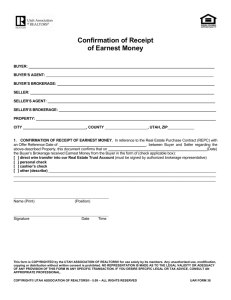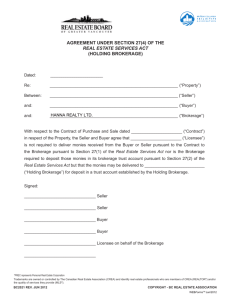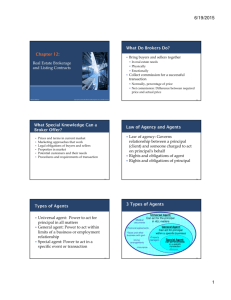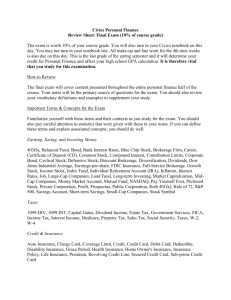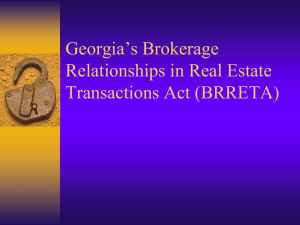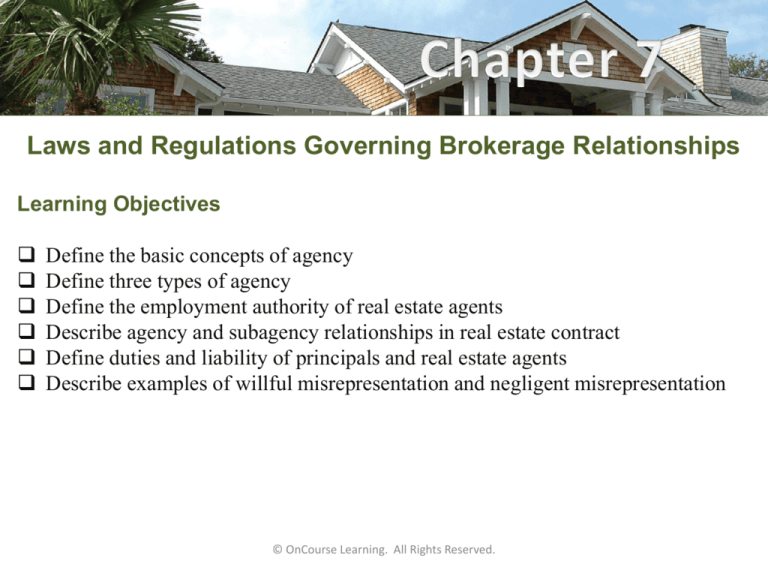
Laws and Regulations Governing Brokerage Relationships
Learning Objectives
Define the basic concepts of agency
Define three types of agency
Define the employment authority of real estate agents
Describe agency and subagency relationships in real estate contract
Define duties and liability of principals and real estate agents
Describe examples of willful misrepresentation and negligent misrepresentation
© OnCourse Learning. All Rights Reserved.
Laws and Regulations Governing Brokerage Relationships
General Agency Concepts and Definitions
Agency:
• A legal relationship that considers firms, agents, subagents, and principals as
the same legal entity
Agent:
• One authorized by another to act on the latter’s behalf
Principal:
• One who appoints agent to represent him or her
Subagent:
• Any licensee or firm working through the agent; thus owing the same duties
and responsibilities to the principal
Fiduciary relationship:
• A relationship of trust between the agent and principal
• Agent becomes trustee of principal
Disclosure of agency relationships in real estate MUST be in writing
© OnCourse Learning. All Rights Reserved.
Laws and Regulations Governing Brokerage Relationships
Classification of Agency Relationships
Universal agency:
• Authority to handle all areas of business for a principal
• Typically requires a Power of Attorney
General agency:
• Authority to handle all aspects of a particular area of a principal’s
dealings
Special agency:
• Limited to one well defined task
• The agent is not authorized to make decisions on the part of the
principal but only to stand in the principal’s place to receive
information and to bring this information to the principal for a decision.
• Ex: Most real estate agency relationships
© OnCourse Learning. All Rights Reserved.
Laws and Regulations Governing Brokerage Relationships
Creation of Agency Relationships
Relationships Between Transactions Parties:
• Created by contractual agreement between the firm and the principal
• Example: Listing agreement. Firm is the agent; seller is the principal
Relationships Between Brokers/Firms:
• In-house brokerage employment agreement between firm and agent
• Co-brokerage agreements between listing and selling firm
© OnCourse Learning. All Rights Reserved.
Laws and Regulations Governing Brokerage Relationships
Creation of Agency Relationships
Implied agency:
• The actions of the principal and agent indicate that they have an agency
agreement
• Duties and responsibilities created by an implied agency are the same as those
created by an express agency
• Unacceptable in real estate because North Carolina Real Estate Commission
rules require all agency agreements to be in writing
• Review of the “Working with Real Estate Agents” pamphlet at first
substantial contact is mandatory
© OnCourse Learning. All Rights Reserved.
Laws and Regulations Governing Brokerage Relationships
Creation of Agency Relationships
Estoppel:
• An individual claims incorrectly that a person is his/her agent
• A third party relies on the incorrect representation
• Individual is prohibited (stopped, estopped) from later claiming the agency
relationship does not exist
• Individual will be liable for the actions of the incorrectly claimed agent
Scope of agent’s authority:
• Expressed
• Agent’s authority is limited to a single charge
© OnCourse Learning. All Rights Reserved.
Laws and Regulations Governing Brokerage Relationships
Creation of Agency Relationships
Scope of agent’s authority:
• Expressed:
• Authorized to do specifically what the agency agreement states
• Implied:
• Based upon custom and may be the result of an expressed agreement
• Example: Agents lists a foreclosure property for the bank. Bank’s
agreement says agent is to maintain the property. Agent is authorized to do
what is reasonable and customary to maintain the property.
• Apparent:
• Based on appearances to a third party that an agent has certain authority
when in fact the agent does not possess such authority
© OnCourse Learning. All Rights Reserved.
Laws and Regulations Governing Brokerage Relationships
Creation of Agency Relationships
Agency & agent compensation:
• Agency relationships are not determined by the source of the
agent’s compensation
• Agency is defined by contract
• Agents owe a fiduciary duty to their principal, regardless of the
source of compensation
© OnCourse Learning. All Rights Reserved.
Laws and Regulations Governing Brokerage Relationships
Agency and Sub-Agency Relationships
Single Agency:
• Limited to being able to represent only one of the parties in a
transaction
• Primary advantage is that of reduced risk
• Major disadvantage is the limitation of being able to only
represent one party
© OnCourse Learning. All Rights Reserved.
Laws and Regulations Governing Brokerage Relationships
Agency and Sub-Agency Relationships
Exclusive Seller Agency:
• Listing with an independent broker:
• This is the clearest of the agency relationships
• The independent broker has a one-on-one relationship with his/her seller
• Listing with a multi-agent firm
• Agency agreements are between the principal and the brokerage firm:
• Individual brokers become subagents of the principal through the firm
• Communication to any subagent is considered the same as communication
to the principal
• Sub-Agency:
• Individual brokers become subagents of the principal through the firm
• Communication to any subagent is considered the same as communication
to the principal
© OnCourse Learning. All Rights Reserved.
Laws and Regulations Governing Brokerage Relationships
Agency and Sub-Agency Relationships
Cooperating with Other Brokers:
• Listing firm and agents are sub-agents of the seller
• Listing firm and agents work with-not for- the buyer
Cooperating Firm Acting as Seller Agent:
• The listing and selling brokers work exclusively for the seller
• Buyer should acknowledge he has been informed the agent is working for the
seller
Exclusive Buyer Agency:
• The buyer is the broker’s principal (client)
• Agency relationship is between the buyer and the broker
Buyer as Principal:
• All agents are working for the seller
© OnCourse Learning. All Rights Reserved.
Laws and Regulations Governing Brokerage Relationships
Agency and Sub-Agency Relationships
Both Seller and Buyer Agency with Dual Agency for In-house Sales:
• Listing firm will also represent the buyer interested in that listing
• Dual agency cannot be entered without being disclosed and “informed
consent” being obtained in writing
Agency Relationship and Real Estate Rentals:
• In property management the landlord is the agent’s principal
• A prospective tenant may hire a broker to find a property. The tenant would be
the broker’s principal
Agency’s Effect on Communication Requirements for Contracts:
• The buyer is the broker’s principal (client)
• Agency relationship is between the buyer and the broker
© OnCourse Learning. All Rights Reserved.
Laws and Regulations Governing Brokerage Relationships
Agency and Sub-Agency Relationships
Agency’s Effect on Communication Requirements for Contracts:
• Agency status is an important determinant on when communication of
acceptance, rejection, or withdrawal of an offer occurs
• Acceptance, rejection, or withdrawal of an offer requires
communication to the offerer, and/or his agent to be effective
• Communication can be by any reasonable means
Agency’s Effect on Disclosure of Material Fact:
• An agent must disclose all material facts he/she knows or reasonably
should have known, regardless of who he/she represents
• Agent must disclose personal information about a third party to the
principal
© OnCourse Learning. All Rights Reserved.
Laws and Regulations Governing Brokerage Relationships
Agency and Sub-Agency Relationships
Termination of Agency:
• Agency relationships end in accordance with terms of agency contract
• Agency contracts must have definite expiration date
• Can be terminated by agent or principal breach of duties
Disclosure of Agency Relationships:
• Must be in writing
• Must be for a definite period of time
• Must contain pre-defined (by NCREC) non-discrimination clause
• Agent is required to review Commission’s Working With Real Estate
Agents brochure with potential client’s by first substantial contact
© OnCourse Learning. All Rights Reserved.
Laws and Regulations Governing Brokerage
Relationships
Agency and Sub-Agency Relationships
First Substantial Contact:
• Flexible point in time in which the seller/buyer would start to disclose
any personal (confidential) information they would not want a third
party to know
• Open House Rule:
• First substantial contact would only occur when a prospect shows
sincere interest in a property as opposed to “looking”
• If first substantial contact is by telephone or other electronic
communication the agent immediately disclose who they represent and
send copy of Working With Real Estate Agents brochure within 3 days
First Contact vs. First Substantial Contact:
• First contact always occurs at first contact
• First substantial contact may not occur at first contact
© OnCourse Learning. All Rights Reserved.
Laws and Regulations Governing Brokerage Relationships
Duties and Liabilities of Agents
Agents Duties to Principals:
• Broker is in a fiduciary (trust) relationship to the principal
Loyalty:
• Broker must work diligently to serve the best interests of the principal
• The broker cannot work for any adverse interests to the principal without
disclosure and principal’s consent
• Requires the agent puts the client’s interests above their own
Obedience:
• The broker is to obey all reasonable and legal instruction from his principal
Skill, Care, Diligence:
• Broker is expected to perform with a degree of skill, care, and diligence
common to other reasonable prudent professionals in a similar undertaking
• Failure to exercise skill, care, and diligence is a breach of agency law and
grounds for disciplinary action
© OnCourse Learning. All Rights Reserved.
Laws and Regulations Governing Brokerage Relationships
Duties and Liabilities of Agents
Disclosure of Information:
• Broker must disclose all information material to the transaction
• Brokers must not disclose certain information to third parties
• Brokers will be liable for misrepresentation
Accounting:
• Broker must account for and promptly remit, as required, all
money or property entrusted to the broker for the benefit of others
• Brokers are required to adequate and accurate records
• Monies must be kept in a separate “trust” account or “escrow”
account
© OnCourse Learning. All Rights Reserved.
Laws and Regulations Governing Brokerage Relationships
Duties and Liabilities of Agents
Agent’s Duties to Principal Under Real Estate License Law and
Commission Rules:
• Addressed in Licensing Law and Rules and Regulations in
Appendix C
Agent’s Duties to Third Parties:
• Agent owes third party honesty and disclosure of material facts
© OnCourse Learning. All Rights Reserved.
Laws and Regulations Governing Brokerage Relationships
Material Facts
Facts About the Property Itself (Defects)
Facts Relating Directly to the Property (Surrounding Influences
Facts Relating Directly to the Ability of the Agent’s Principal to
Conclude the Transaction
Facts Known to be of Specific Important to a Particular Party
Third Party Personal Information That Must be Disclosed to Agent’s
Principal:
• Willingness to agree to terms other than those stated previously
• Motivation
• Information that might influence the principal’s decision in a
transaction
© OnCourse Learning. All Rights Reserved.
Laws and Regulations Governing Brokerage Relationships
Material Facts
Misrepresentation:
• False or incorrect information
• Willful Misrepresentation:
• Stated intentionally or without regard to actual facts
• Negligent Misrepresentation:
• Unintentional
• Had the agent utilized reasonable skill, care, and diligence the
misrepresentation would not have occurred
• Agent “reasonably should have known”
© OnCourse Learning. All Rights Reserved.
Laws and Regulations Governing Brokerage Relationships
Material Facts
Omission:
• Failure to disclose information
• Willful omission:
• Deliberate failure to disclose material facts known to agent
• Negligent omission:
• Unintentional failure to disclose material facts the agent “reasonably should
have known”
© OnCourse Learning. All Rights Reserved.
Laws and Regulations Governing Brokerage Relationships
Other Laws Governing the Disclosure of Information in Real Estate
Transactions
Stigmatized/Psychologically Impacted Properties:
• Serious illness, or death, of a previous occupant
• AIDS - considered a handicap by federal law and not to be disclosed
• Registered sex offender
Consumer Legislation:
• North Carolina Unfair and Deceptive Trade Practices Acts prohibits the use of
unfair or deceptive practices in commerce
• North Carolina allows treble damages for violations
Seller’s and Buyer’s Responsibilities Under Common Law:
• North Carolina Unfair and Deceptive Trade Practices Acts prohibits the use of
unfair or deceptive practices in commerce
• North Carolina allows treble damages for violations
© OnCourse Learning. All Rights Reserved.
Laws and Regulations Governing Brokerage Relationships
Other Laws Governing the Disclosure of Information in Real Estate
Transactions
Seller’s and Buyer’s Responsibilities Under Common Law:
• Caveat Emptor (let the buyer beware) – Seller has no obligation to buyer
beyond avoiding fraudulent acts
• Broker must disclose even if seller has no obligation to do so
North Carolina Residential Property Disclosure Act:
• Applies to most residential transfers (including owners selling own property)
• Some exemptions from this act
• Because of Caveat Emptor seller may select the box “No Representation” and
seller is relieved of obligation to disclose even if he knew of condition
• Statement must be provided to buyer no later than the first Offer to Purchase
• If form not provided buyer has right to cancel within three days
© OnCourse Learning. All Rights Reserved.
Laws and Regulations Governing Brokerage
Relationships
Other Laws Governing the Disclosure of Information in Real Estate
Transactions
“As Is” Sale:
• Does not relieve agent of responsibility to reveal material facts including
defects
Lead-Based Paint Disclosure:
• Applies to properties built prior to 1978
• Buyers/lessees must be provided EPA pamphlet Protect Your Family From
Lead In Your Home
© OnCourse Learning. All Rights Reserved.
Laws and Regulations Governing Brokerage
Relationships
Other Laws Governing the Disclosure of Information in Real
Estate Transactions
Synthetic Stucco Disclosure:
• NCREC considers existence of synthetic stucco to be a material fact
• Brokers must disclose even if property formerly covered in synthetic
stucco
Liabilities and Consequences of Agent’s Breach of Duties:
• Disciplinary action by NCREC
• Civil liability of agent
• Criminal liability of agent
• Civil liability of principal (for agent’s misconduct)
© OnCourse Learning. All Rights Reserved.
Laws and Regulations Governing Brokerage Relationships
Dual Agency
Dual Agency Basics:
• Exists when a firm attempts to represent both the seller and the buyer in the
same transaction
• It does NOT exist when the listing firm is working with a buyer that it does not
represent since it does not have written or oral buyer agency agreement
Inherent Potential Conflicts of Interest
Unintentional, Undisclosed Dual Agency:
• Agents are prohibited from “acting for more than one party in a transaction
without the knowledge of all parties for whom he or she acts”
• Often occurs when agent has written authority to represent one party but acts
in such manner to benefit the other party without the principal’s knowledge or
consent
© OnCourse Learning. All Rights Reserved.
Laws and Regulations Governing Brokerage Relationships
Dual Agency
Intentional, Disclosed Dual Agency/How To Handle in North Carolina:
• Must be disclosed in advance and have written and “informed” consent of each
party
• The firm shall not disclose personal information about one party to the other
party without consent
• Must be disclosed to the other party at first contact
Designated Agency:
• Type of Dual Agency
• Limited to in-house transactions where one individual agent is designated to
represent the interests of the seller and the other agent to represent the buyer
• Agent is not allowed to practice designated agency where the agent has
obtained personal or confidential information about the other party prior to
becoming designated
• BIC is not allowed to engage in designated agency with provisional broker
under his supervision
© OnCourse Learning. All Rights Reserved.
Laws and Regulations Governing Brokerage Relationships
Duties and Liabilities of Principals
Principals Duties to Agents:
• Must generally cooperate with the agent
• Compensation
Principals Duties to Third Parties:
• Caveat Emptor
• Seller has no responsibility for disclosure of defects that should have been
discovered during inspection
• Seller has duty not to conceal defects where a reasonable inspection would not
disclose
Liabilities and Consequences of Principal’s Breach of Duties:
• Civil liability
• Criminal liability
• Liability to the agent for withholding or giving false information
© OnCourse Learning. All Rights Reserved.

